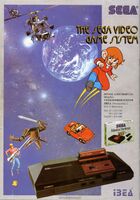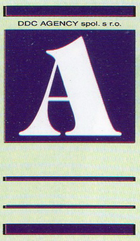Difference between revisions of "History of Sega in Czechia"
From Sega Retro
Lukdriver14 (talk | contribs) |
Lukdriver14 (talk | contribs) |
||
| Line 35: | Line 35: | ||
|score|15|41 | |score|15|41 | ||
}} | }} | ||
| − | {{ | + | {{gitem |
| − | | | + | |Notavailable.svg|Print advert in LeveL (CZ) #4: "Květen 1995" (1995-05-01)}} |
| − | }} | ||
==DDC Agency== | ==DDC Agency== | ||
| Line 76: | Line 75: | ||
At the same time, Sega games from [[Empire]] were distributed by [[Dynamic Systems]]. | At the same time, Sega games from [[Empire]] were distributed by [[Dynamic Systems]]. | ||
| − | {{ | + | {{gitem |
| − | | | + | |Notavailable.svg|Print advert in LeveL (CZ) #71: "Prosinec 2000" (2000-1x-xx)}} |
| − | }} | ||
== CD Projekt and Cenega== | == CD Projekt and Cenega== | ||
Revision as of 09:40, 27 February 2021

|
| History of Sega in Czechia |
|---|
| Official Sega distributor(s): Independent retail outlets (1988-1990), Sega CSRF (1990-1992), Datart (1993-1996), ITO CS (1993-1996), Popron Distribuce (1994-1996), DDC Agency (1996-1998), Fliko (2000-2002), CD Projekt (2004-2016), Cenega (2016-present) |
Contents
Czechoslovakia
Throughout its existence, Czechoslovakia saw the release of the Sega Master System console. Sega started selling its products in Czechoslovakia in 1988. The sale of video games was handled by independent retail outlets. In 1990, Sega established an office in this country.[1] Consoles were sold by authorized distributors such as IBEA in Slovakia or Enisof in the Czech Republic. On January 1, 1993, Czechoslovakia split into two different countries.
Datart, ITO CS and Popron Distribuce
After the break-up, Datart became the authorized distributor of Sega, which released Mega Drive I, Master System II and Game Gear. At the end of 1993, the second distributor, ITO CS, was selected. This is also where the popularity of Sega consoles on the market began to grow and soon these video games became quite widespread in the Czech Republic. In 1994, in addition to the appearance of the Mega Drive II and Mega CD II, a third authorized distributor, Popron Distribuce, was selected. From that moment on, distributors also started to create Czech game manuals for Sega consoles. Third-party companies also created their own structures, such as the Schiel Games Shop.
Popron did not want to wait for the European premiere of Sega Saturn, so in the first half of 1995 he started importing Japanese versions of the console, which cost 25,000 CZK.[2]. At that time, the Mega Drive 32X and Sega Multi Mega officially appeared in the Czech Republic.
In addition to the official consoles, there were also famiclones on the market such as Terminator 2 modeled on Sega Mega Drive, Bel Game, Pegasus IQ-502, Video Game-GT3300, Micro Genius (via Atelier) and many more.
DDC Agency
In 1996, the DDC Agency became a distributor of Sega and Atari in the Czech Republic and Slovakia and released Sega Saturn. The company had four authorized distributors in the Czech Republic:
- Trojanec- Brno and South Moravia
- Ozón-West Bohemia and North Bohemia
- Euro Shop Ostrava-North Moravia and the East Bohemia
- Zlatý Tygr- South Bohemia
Sega's products have been well advertised in several major gaming magazines, the ABC children's magazine, and at gaming events such as HIT 96. The DDC Agency has created a specialized Sega gaming magazine called Sega News, published since October 1996.
At that time, Mega Drive clones began to appear, as well as pirated copies of games with Czech manuals. These clones were sold until the end of the 90s. One of the sellers of these clones was Sat Game, which released Star Drive DS 1603 and Genesis 2.
Despite the promotion, Saturn did not sell that well in the Czech Republic. From the spring of 1997, Sega consoles were less and less advertised and the Sega brand began to lose its importance in the Czech Republic. Authorized distributors were selling Saturn and Mega Drive until 1998.
In second half of the 90s, Comex became distributor of Sega arcades.[12]
Fliko and Dynamic Systems
Sega Dreamcast appeared in March 2000. Fliko was selected as the general importer of Sega products. Many hopes that Sega will launch an internet connection, however, this did not happen mainly because Sega did not choose its representative who was to deal with this issue and extend the promotion of the console. The situation became even more complicated when it turned out that Dreamcast, due to its high price, is selling very poorly in these countries. In February 2001, it was estimated that there were less than 1000 Dreamcasts in the Czech Republic. It is worth noting that at the same time there were over 60,000 first PlayStation models in this country. These circumstances associated with the collapse of Dreamcast in Western Europe resulted in Sega's lack of further interest in this market.[23].
At the same time, Sega games from Empire were distributed by Dynamic Systems.
CD Projekt and Cenega
In 2004, the CD Projekt company became a distributor of Sega in the Czech Republic and Slovakia.[24]The company slowly became a representative of Sega in other countries of the Visegrad Group. In 2016, Cenega become representative of Sega.[25]
References
- ↑ https://www.telecompaper.com/news/video-games-market-small--23097
- ↑ Level #5 page 36
- ↑ Excalibur, "" (CZ; 1993-03-10), page 31
- ↑ Excalibur, "" (CZ; 1993-05-10), page 15
- ↑ Excalibur, "" (CZ; 1993-09-10), page 39
- ↑ Excalibur, "" (CZ; 1993-10-10), page 19
- ↑ Score, "Listopad 1994" (CZ; 1994-11-01), page 2
- ↑ Score, "Prosinec 1994" (CZ; 1994-12-01), page 23
- ↑ Score, "Leden 1995" (CZ; 1995-01-01), page 41
- ↑ Score, "Únor 1995" (CZ; 1995-02-01), page 41
- ↑ Score, "Březen 1995" (CZ; 1995-03-01), page 41
- ↑ Neo Plus 11 page 74
- ↑ Sega News, "Říjen 1996" (CZ; 1996-xx-xx), page 35
- ↑ Score, "Listopad 1996" (CZ; 1996-11-01), page 111
- ↑ Sega News, "Listopad 1996" (CZ; 1996-1x-xx), page 2
- ↑ Score, "Prosinec 1996" (CZ; 1996-12-01), page 113
- ↑ Sega News, "Prosinec 1996" (CZ; 1996-1x-xx), page 2
- ↑ Sega News, "Říjen 1996" (CZ; 1996-xx-xx), page 36
- ↑ Score, "Listopad 1996" (CZ; 1996-11-01), page 113
- ↑ Sega News, "Listopad 1996" (CZ; 1996-1x-xx), page 44
- ↑ Score, "Prosinec 1996" (CZ; 1996-12-01), page 115
- ↑ Sega News, "Prosinec 1996" (CZ; 1996-1x-xx), page 44
- ↑ https://ekonomika.idnes.cz/nova-konzole-dreamcast-prehrava-konkurenci-feh-/test.aspx?c=2000M051T05A
- ↑ https://games.tiscali.cz/byznys/cd-projekt-exkluzivnim-distributorem-her-od-sega-24752
- ↑ https://web.archive.org/web/20160607060703/http://www.sega.com:80/support/




